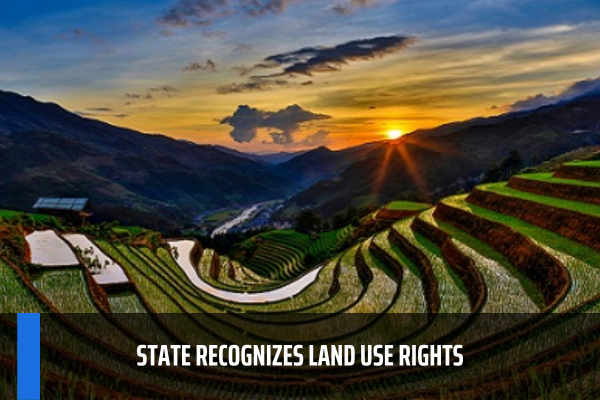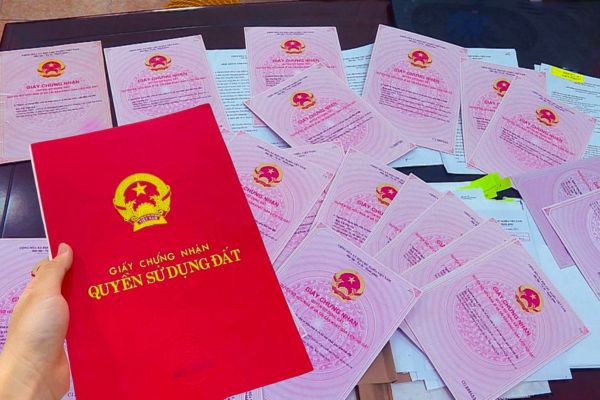What are land use rights recognized by the State in Vietnam? Who are land users whose land use rights are recognized by the State?
What are land use rights recognized by the State in Vietnam?
The land use rights recognized by the State is explained according to the provisions of Clause 9, Article 3 of the Land Law 2013 as follows:
9. The State recognizes land use rights means that the State grants land use rights to a person that is using stably the land not allocated or leased by the State, through the grant of a certificate of land use rights and ownership of houses and other land-attached assets for the first time, for a certain land parcel.
Thus, the State recognizes land use rights means that the State grants land use rights to a person that is using stably the land not allocated or leased by the State, through the grant of a certificate of land use rights and ownership of houses and other land-attached assets for the first time, for a certain land parcel

What are land use rights recognized by the State in Vietnam? Who are land users whose land use rights are recognized by the State? (Image from Internet)
What are the bases for determining stable land use to recognize land use rights in Vietnam?
The bases for determining stable land use to recognize land use rights is specified in Article 21 of Decree 43/2014/ND-CP (amended by Article 11 of Decree 104/2022/ND-CP) as follows:
The time of starting the stable land use shall be determined based on the time and contents related to the land use purpose stated in one of the following documents:
- Receipt of agricultural land use tax and house and land tax;
- Written record or decision on sanctioning of administrative violation in land use, written record or decision on sanctioning of administrative violation in the construction of land-attached facilities;
- Decision or judgment of a people’s court which has taken legal effect or judgment enforcement decision of a judgment enforcement agency which has been enforced regarding land-attached assets;
- Decision of a competent state agency on settlement of a land dispute which has taken legal effect; minutes of conciliation of a land dispute bearing signatures of disputing parties and certification of the commune-level People’s Committee of the locality where the disputed land is located;
- Decision on settlement of a land use-related complaint or denunciation of a competent state agency;
- citizen identity card or identity card or birth certificate; electricity, water bills and other bills showing the residential address in the registered land plot. In case it is impossible to access the residence information in the National Population Database, the certificate of residence information shall be supplemented.
- Document on assignment, allocation or distribution of house or land by the agency or organization assigned by the State to manage and use land;
- Document on purchase and sale of houses and other land-attached assets or documents on purchase and sale of land and transfer of land use rights bearing signatures of related parties;
- Maps, registers and documents on land survey and measurement in different periods;
- Declaration of houses and land for registration bearing the certification of the commune-level People’s Committee at the time of declaration and registration.
Note:
- In case the points of time of land use shown in the documents specified in Clause 2 of Article 21 of Decree 43/2014/ND-CP are inconsistent, the time of starting stable land use shall be determined according to the document showing the earliest date of land use.
- In case none of the documents specified in Clause 2 of Article 21 of Decree 43/2014/ND-CP is available or they do not clearly state the time of document establishment and land use purpose, there must be the commune-level People’s Committee’s certification of the time of starting land use and land use purpose based on opinions of persons who have once resided in the land by the time when the certification requester starts the land use in the residential area (village, hamlet or street quarter) where the land is located.
Vietnam: Who are land users whose land use rights are recognized by the State?
Land users whose land use rights are recognized by the State are stipulated in Article 5 of the Land Law 2013 as follows:
Land users may be allocated land or leased land, have land use rights recognized by the State, or acquire land use rights in accordance with this Law, including:
- Domestic organizations, including state agencies, people’s armed forces units, political organizations, socio-political organizations, economic organizations, socio-politico-professional organizations, social organizations, socio-professional organizations, public non-business organizations, and other organizations as prescribed by the civil law (below referred collectively to as organizations).
- Domestic households or individuals (below referred collectively to as households or individuals).
- Communities, including Vietnamese communities residing in the same village, street quarter or similar residential area sharing the same customs and practices or the same family line.
- Religious institutions, including pagodas, churches, oratories, chancels, monasteries, abbeys, religious schools, head offices of religious organizations, and other religious institutions.
- Foreign organizations with diplomatic functions, including diplomatic representative missions, consulates, other foreign representative agencies with diplomatic functions recognized by the Vietnamese Government, representative missions of organizations of the United Nations, inter-governmental agencies or organizations, and representative missions of inter-governmental organizations.
- Overseas Vietnamese as prescribed by the nationality law.
- Foreign-invested enterprises, including 100% foreign-invested enterprises, joint-venture enterprises, Vietnamese enterprises in which foreign investors purchase shares, merge or acquire in accordance with investment law.
LawNet
